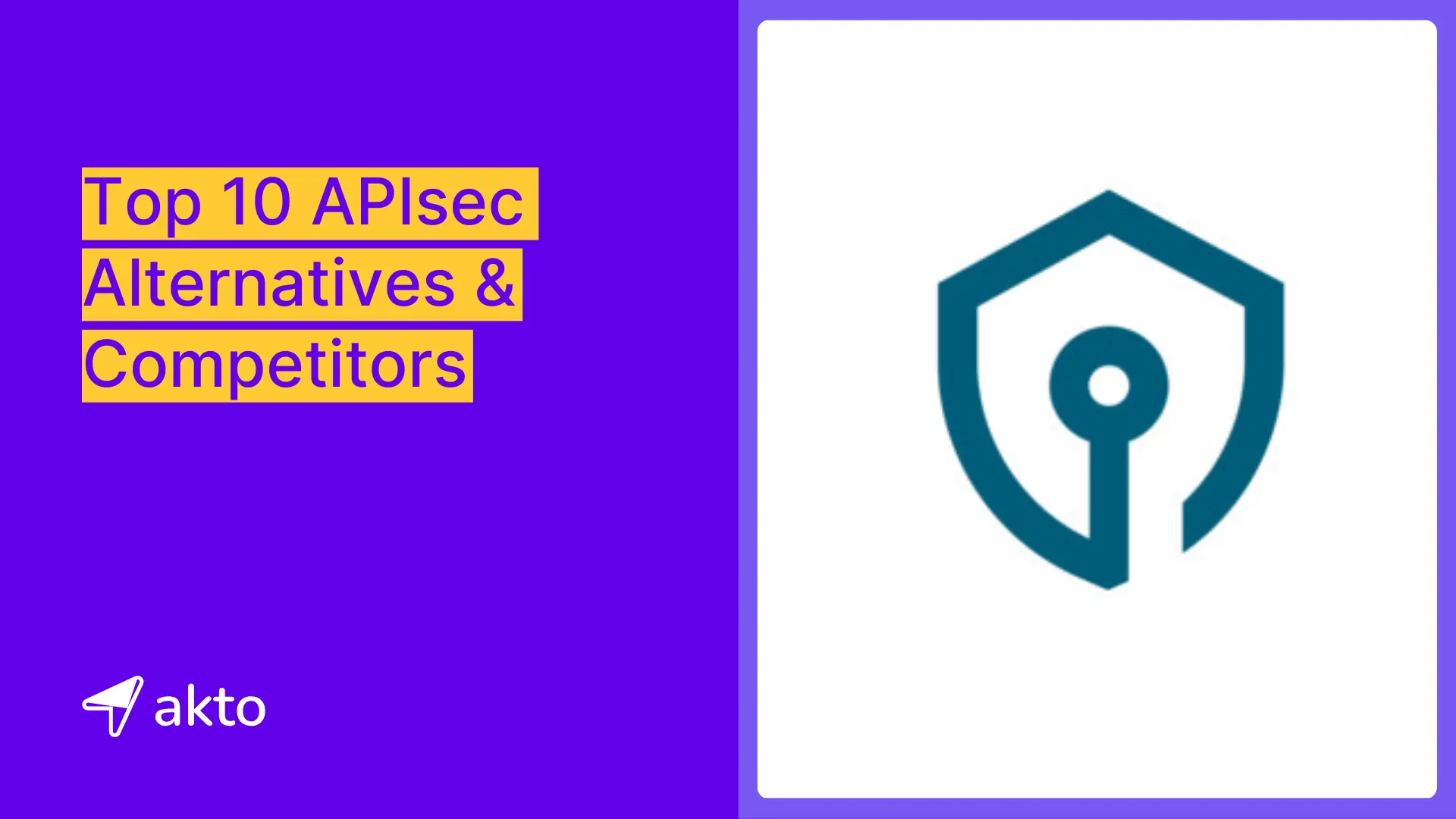Best APIsec Alternatives and Competitors
Explore the top APIsec alternative in 2025 to strengthen your API security and ensure protection against vulnerabilities and threats.

Kruti
Feb 11, 2025
Organizations utilize APIs for internal and external communication; thus, protecting these endpoints is critical to prevent unauthorized access and data leaks. APIsec is a complete API security solution that protects organizations from vulnerabilities, data breaches, and attacks on APIs. APIsec helps organizations secure their API endpoints by using automated security scanning, real-time monitoring, and vulnerability management to provide resilience to evolving threats.
This blog explores the top 10 APIsec alternatives and competitors, outlining their key benefits, pros, and cons and helping organizations choose the best API security solution.
Top 10 APIsec Alternatives and Competitors
Organizations can choose from various solutions to protect APIs from vulnerabilities and cyber threats. Here are the top ten competitors and alternatives for APIsec.
1. Akto
Akto is an API security platform that performs regular monitoring and testing for security weaknesses. It detects and reduces API vulnerabilities automatically and easily. Akto works easily with CI/CD pipelines and offers AI-driven protection for continuous API security. Its simple design allows organizations to simply protect their APIs throughout the lifecycle, making it the best APIsec alternative.
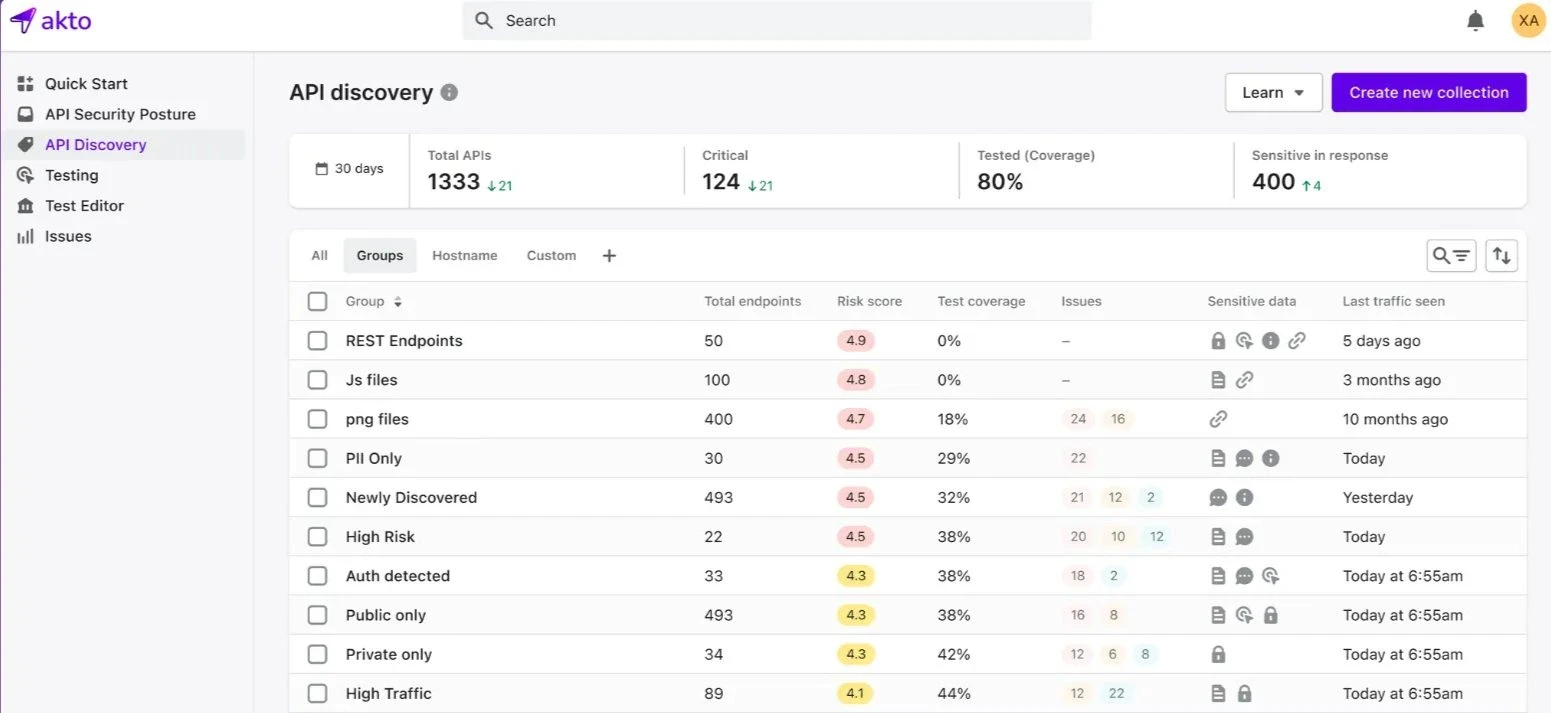
Features of Akto
Detects and prevents API attacks regularly as they occur.
Finds security threats in APIs automatically.
Connects easily with CI/CD pipelines and continuous integration and deployment pipelines.
Provides deep and accurate reports and notifications.
Advantages of Akto
Quickly finds vulnerabilities and fixes them.
An easy-to-use interface with deep reporting.
Secures REST and GraphQL APIs.
Machine learning-based threat detection.
Easily connects with CI/CD pipelines.
2. Cequence Security
Cequence offers a single API security platform that assures complete protection at all API endpoints. It monitors APIs in real time to detect and reduce unwanted activity, bot attacks, and API misuse. Cequence provides advanced analysis and risk assessment to help organizations prevent data breaches and other major risks. This platform works with both old and current API architectures, assuring security at all stages.
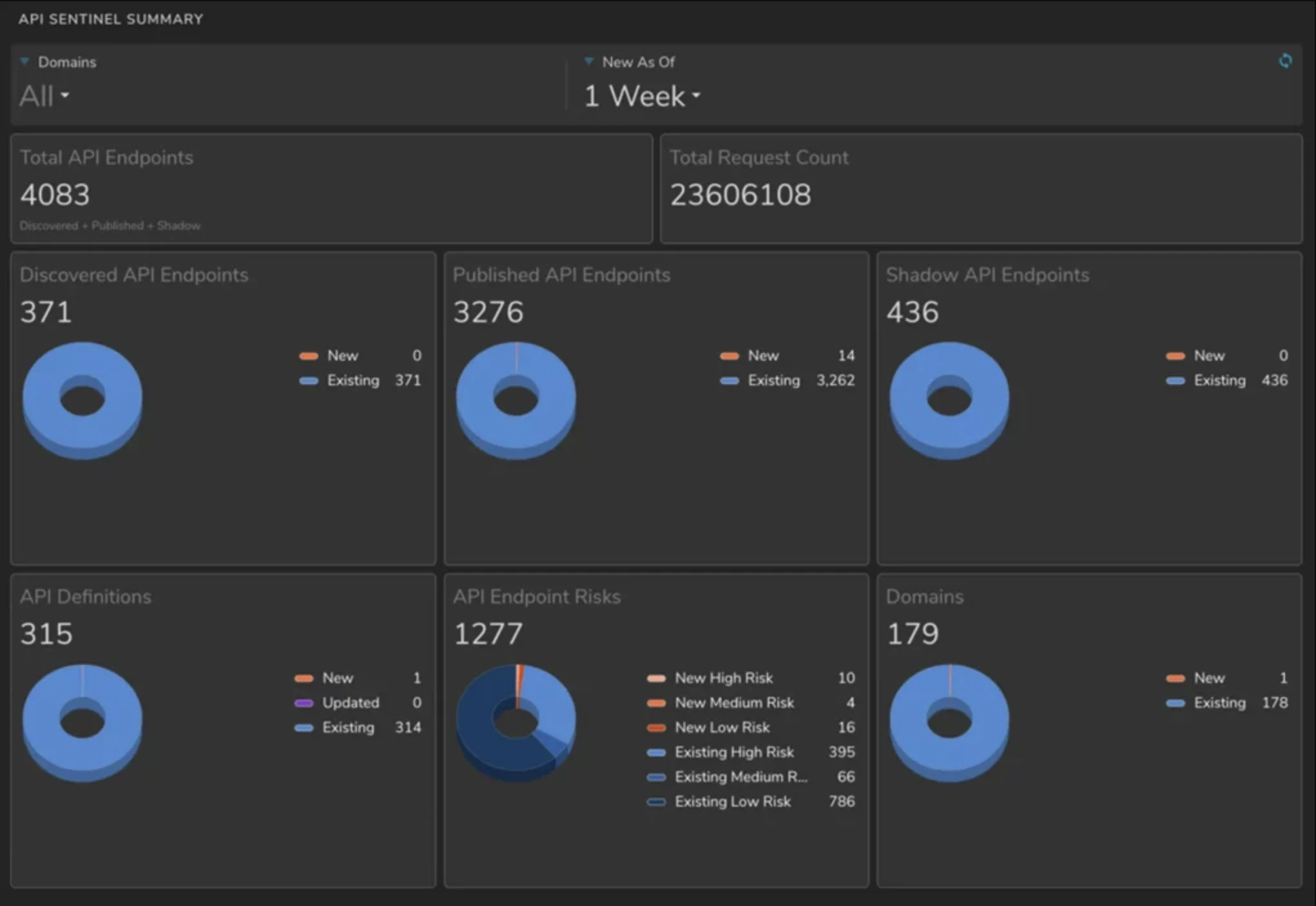
Source - Cequence Security
Features of Cequence Security
Protects APIs throughout their lifecycle.
Prevents bot traffic, credential stuffing, and DDoS attacks.
Provides quick notifications about malicious activity targeting APIs continuously.
Offers deep security and API reports.
Give scores to APIs according to vulnerabilities.
Advantages of Cequence Security
Protects against bot attacks and API exploitation.
Real-time threat identification and mitigation.
Simply combines with existing infrastructure.
Provides deep API risk reports and notifications.
It protects both standard and microservice APIs.
Disadvantages of Cequence Security
Installation can take time.
Costly for small organizations.
New users may find it hard to understand.
3. Tenable AI
Tenable provides API security solutions that focus on continuous vulnerability management and real-time monitoring of API vulnerabilities. It easily combines with the Tenable package allows organizations to maintain compliance, reduce attack surfaces, and stay ahead of API vulnerabilities. Tenable's API security solution is flexible and for both small and large organizations that need strong API protection.
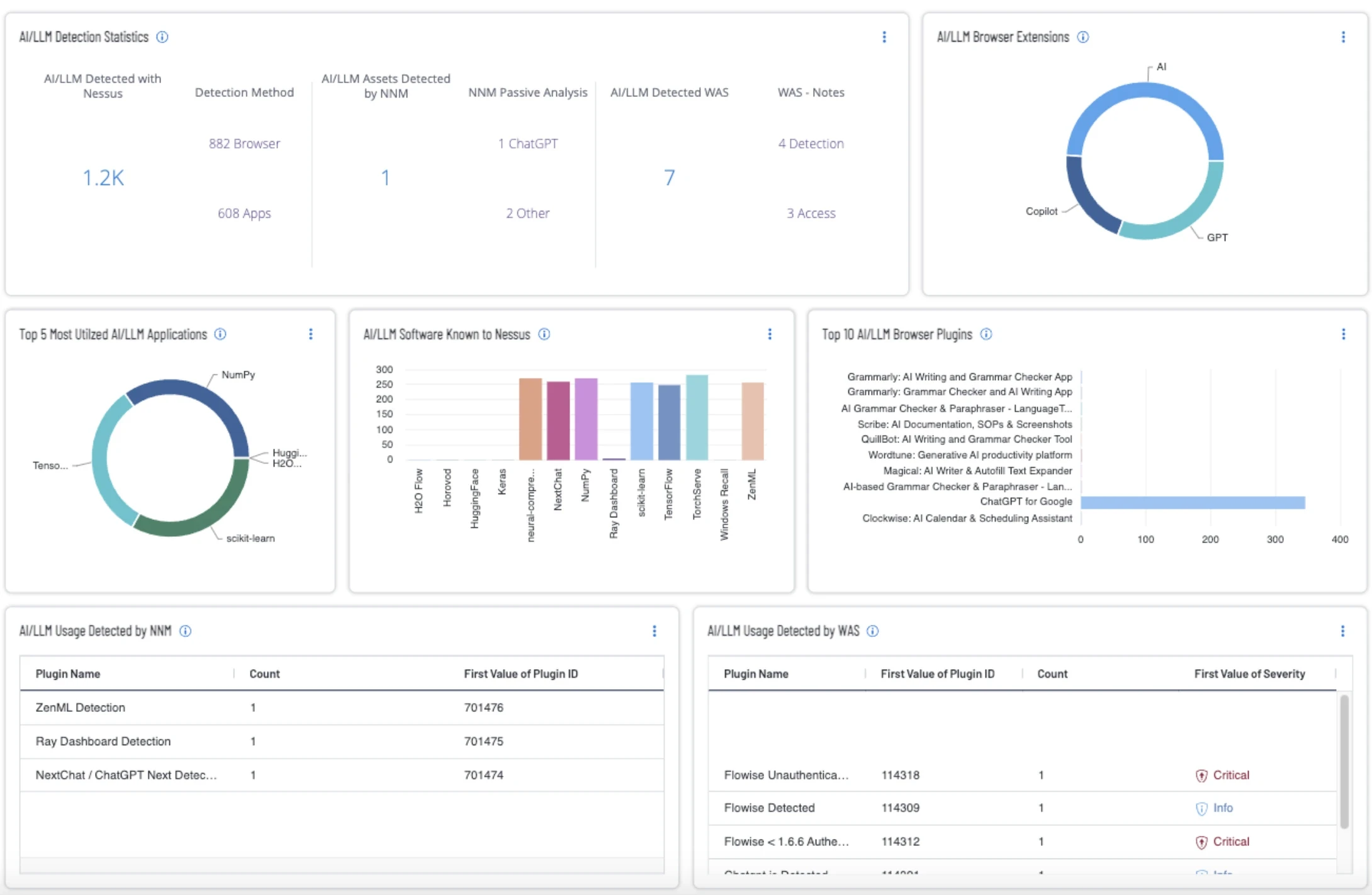
Source - Tenable AI
Features of Tenable AI
Continuously scans for API and application vulnerabilities.
Provides quick notifications and threat intelligence.
Improves overall security posture by connecting with Tenable's tool set.
Allows organizations to meet regulatory and security standards.
Prioritizes security measures by ranking APIs based on risk.
Advantages of Tenable AI
Advanced vulnerability scanning capabilities.
Integration into the larger Tenable security ecosystem.
Continuous threat intelligence and alerts.
Customizable risk management dashboards.
Suitable for compliance-intensive industries.
Disadvantages of Tenable AI
It may be too difficult for small organizations.
Setup and setting can be time-consuming.
Advanced features require a higher price tier.
4. Pynt
Pynt is an API security solution that provides visibility into API vulnerabilities and threats. Pynt provides security scanning tools that can identify API vulnerabilities and give quick solutions. It allows automatic risk assessments and continuous monitoring, ensuring that API endpoints are safe from attackers. Pynt is well-known for its ease of use and versatility in protecting APIs on a large scale.
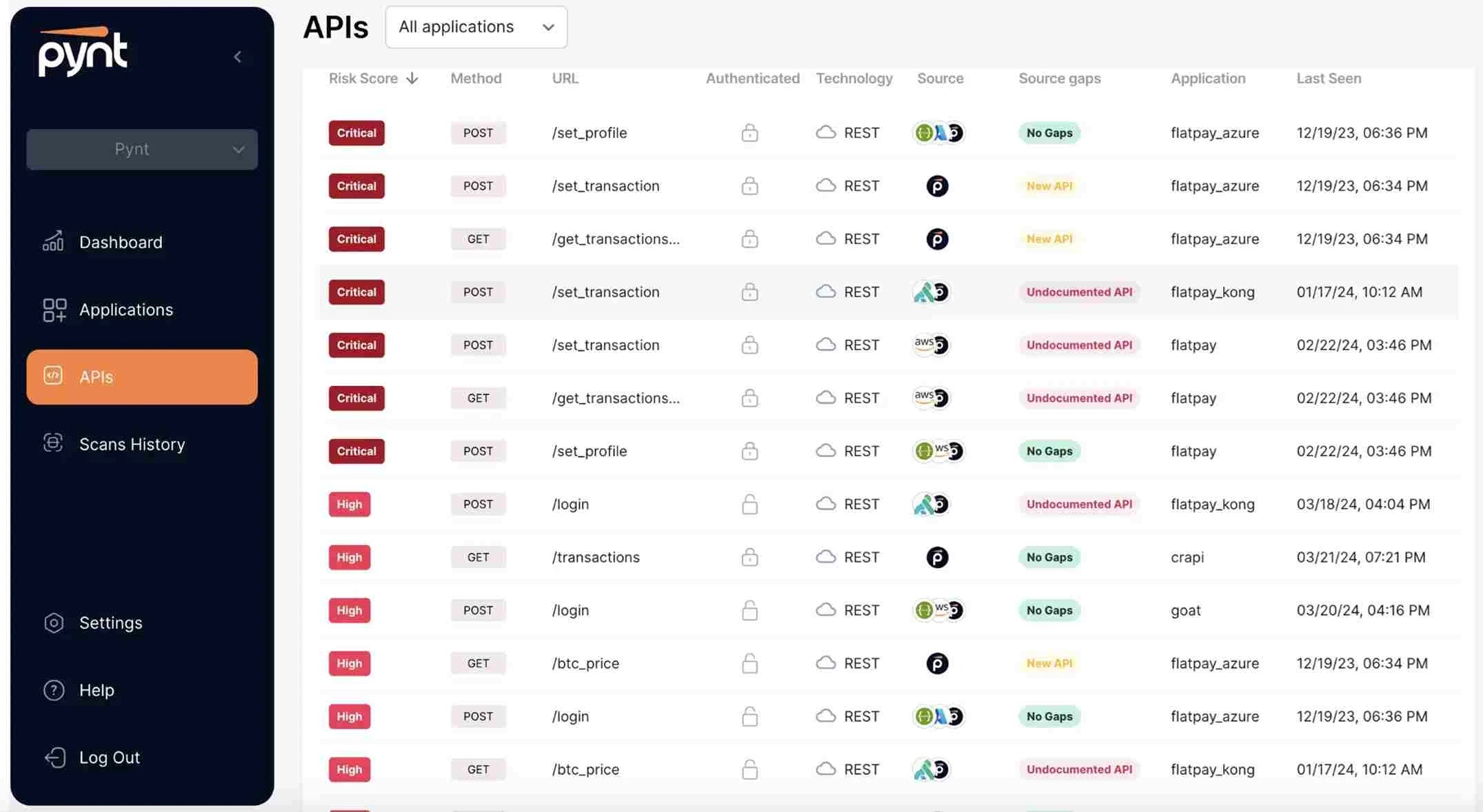
Source - Pynt
Features of Pynt
Checks APIs for vulnerabilities automatically.
Detects and alerts on active threats to APIs.
Supports various API types, including REST and GraphQL.
The dashboard is easy to use.
Provides deep reports that provide fixation advice.
Advantages of Pynt
Easy vulnerability scan and repair.
Real-time monitoring of API risks.
It supports both REST and GraphQL APIs.
Combines easily with the existing security infrastructure.
Disadvantages of Pynt
Lower pricing plans have fewer features.
A smaller user base and fewer integrations.
Some cases lack advanced threat detection.
5. Akamai
Akamai is an API security platform that protects APIs against external threats and ensures their dependability and efficiency. Akamai is known for its web application firewall (WAF) that combines API security with a global content delivery network. It protects APIs from data breaches, denial-of-service (DoS) attacks, and other cyber threats while giving excellent performance.
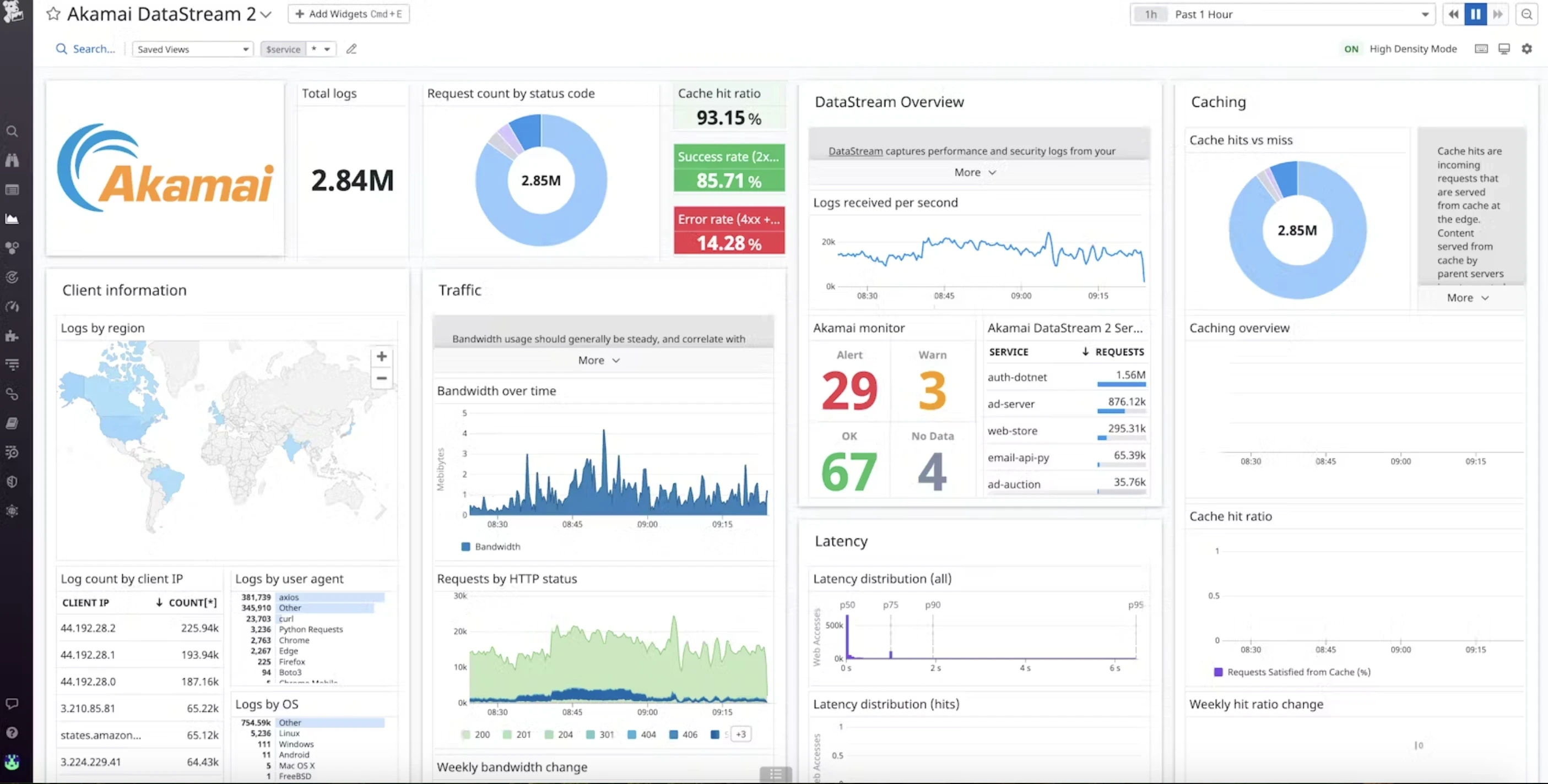
Source - Akamai
Features of Akamai
Uses Akamai's global content delivery network to improve performance and security.
Protects APIs against large-scale distributed denial-of-service assaults.
Continuously analyzes API traffic and alerts about questionable activity.
Prevents bots and protects against account takeover and credential stuffing.
Capable of handling huge traffic volumes and enterprise-scale requirements.
Advantages of Akamai
Effective DDoS defense and network security.
Big API security coverage for big organizations.
Continuous threat mitigation and traffic filtering.
Comprehensive global infrastructure.
Cons of Akamai
It may be costly for smaller organizations.
This may be hard to understand for users who are new to CDN-based security.
Limited customization choices for smaller-scale installations.
6. Imperva Security
Imperva is a well-known security platform that offers full API protection against a variety of threats, such as DDoS attacks, API misuse, and data breaches. Its solution focuses on real-time threat identification and prevention, with advanced features for API traffic monitoring, security analytics, and policy enforcement. Imperva's high-performance security ensures the safety of the APIs, making it a top APIsec alternative.
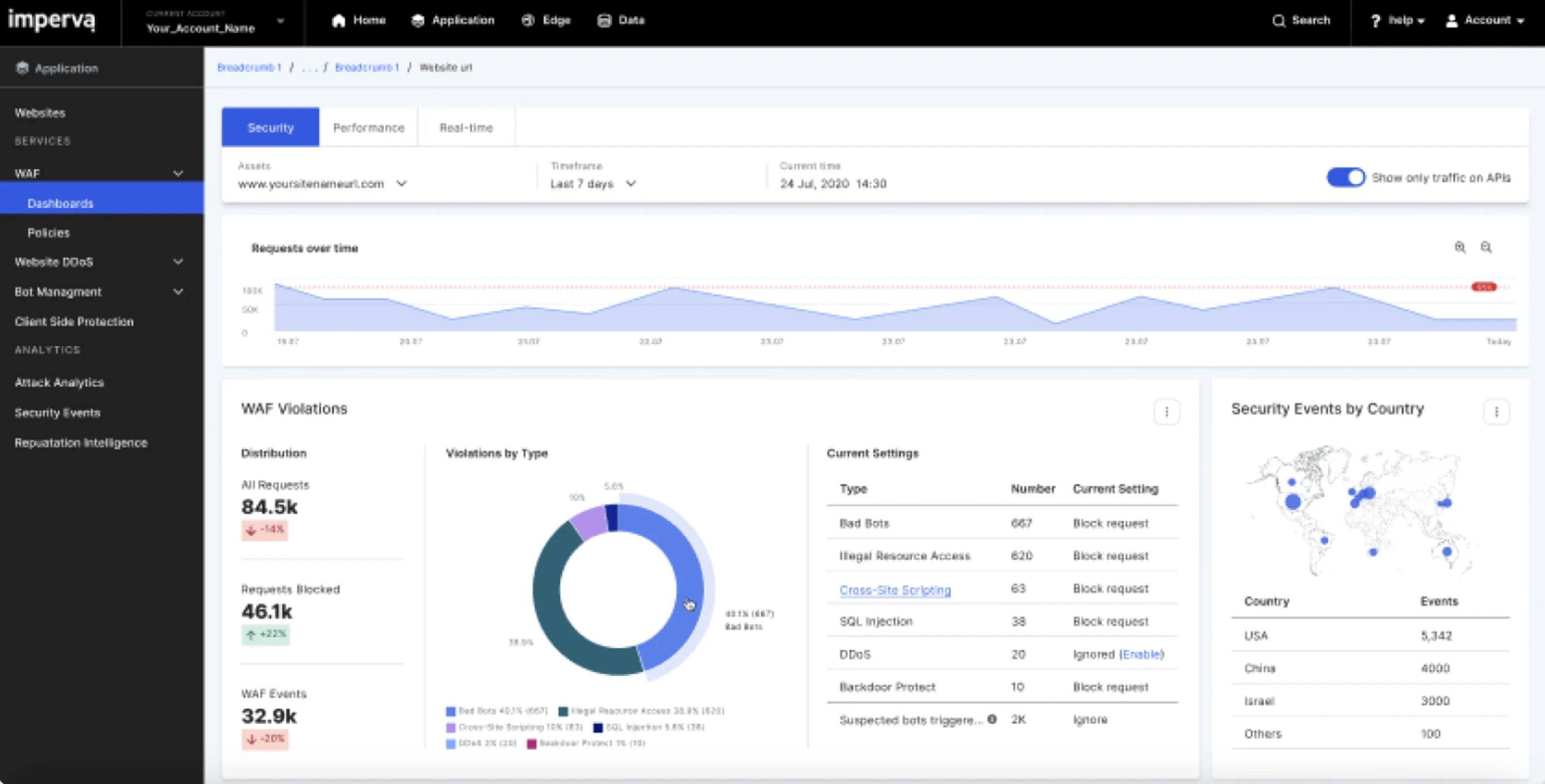
Source - Imperva
Features of Imperva Security
Protects APIs against DDoS attacks using powerful mitigation technologies.
Send quick notifications and complete security reports.
Detects and protects against harmful API traffic automatically.
Allows to make changes in security settings to fit unique organizational requirements.
Uses threat intelligence to stay on top of developing API risks.
Advantages of Imperva Security
High-performance DDoS and bot defense.
Real-time notifications and accurate insights.
Easy connection into cloud-based infrastructure.
API security policies are under fine control.
Adjustable to different business sizes.
Disadvantages of Imperva Security
It may be costly for small organizations.
It may have a few complicated configurations.
7. OWASP ZAP
OWASP ZAP, or Zed Attack Proxy, is an open-source pen testing tool for web applications and APIs. It offers complete security testing features, like automatic scanning and a manual testing tools. Security professionals use ZAP to find vulnerabilities in APIs and web applications. Its flexibility makes it a popular choice for developers and security teams.
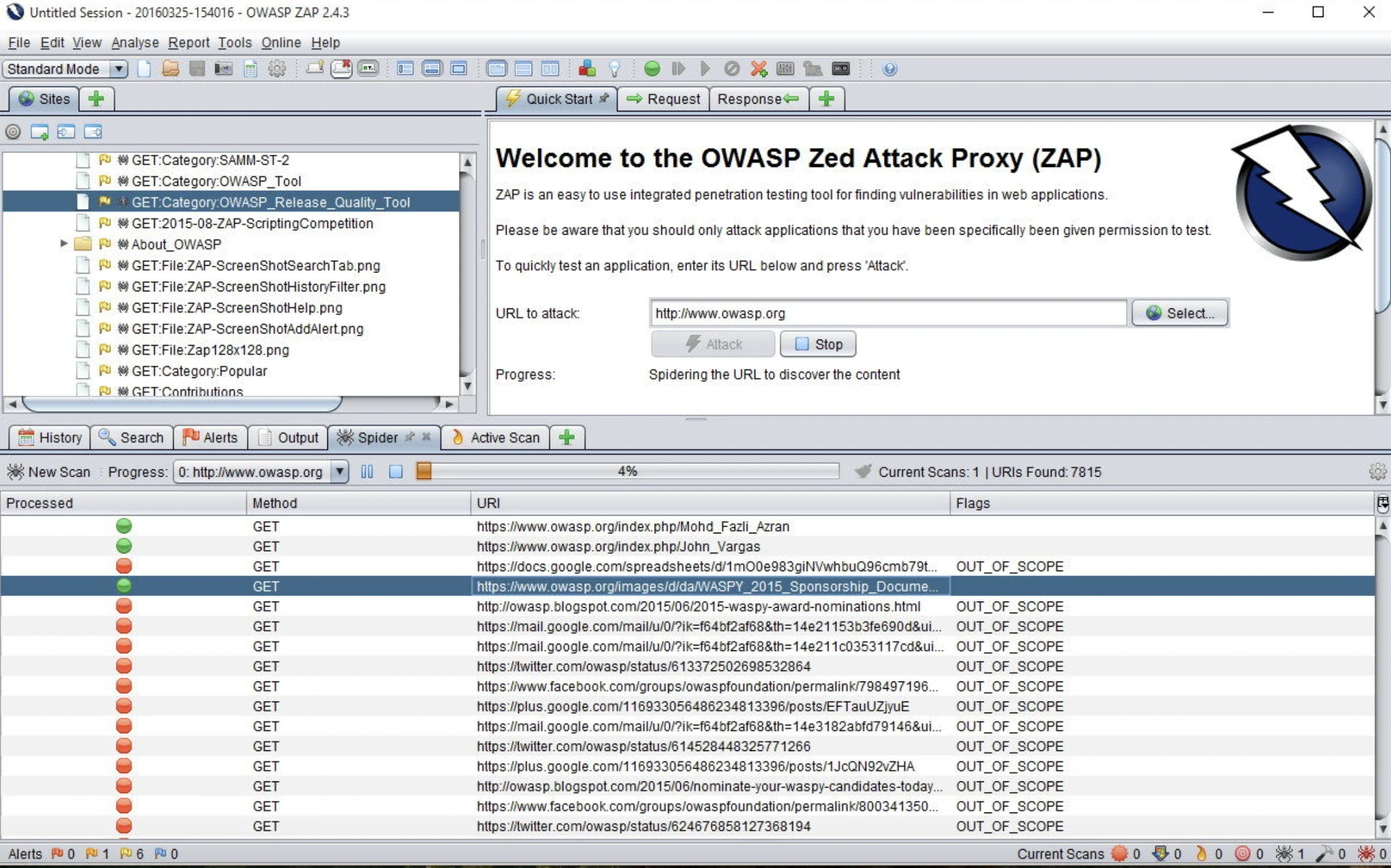
Source - OWASP ZAP
Features of OWASP ZAP
A free, open-source tool to manage APIs and web application security.
Uses automated vulnerability scans to detect common API attacks.
Supports manual testing by providing tools for API penetration testing.
Provides plugin extensions and integration with CI/CD workflows.
A huge community that provides regular updates and upgrades.
Advantages of OWASP ZAP
A free and open-source tool.
Flexible and adaptable to various types of testing.
Combines easily with CI/CD processes.
Performs automatic and manual vulnerability scans.
Disadvantages of OWASP ZAP
More skills are needed for correct installation.
It may not be as fast as other solutions.
Hard to combine with modern security systems.
8. Invicti
Invicti (previously Netsparker) is a security platform for APIs and web applications that finds and fixes vulnerabilities. Its automatic detection features offer real-time vulnerability scanning of APIs. The user-friendly interface of Invicti, along with strong automated scanning and thorough reporting, makes it suited for organizations of all sizes.
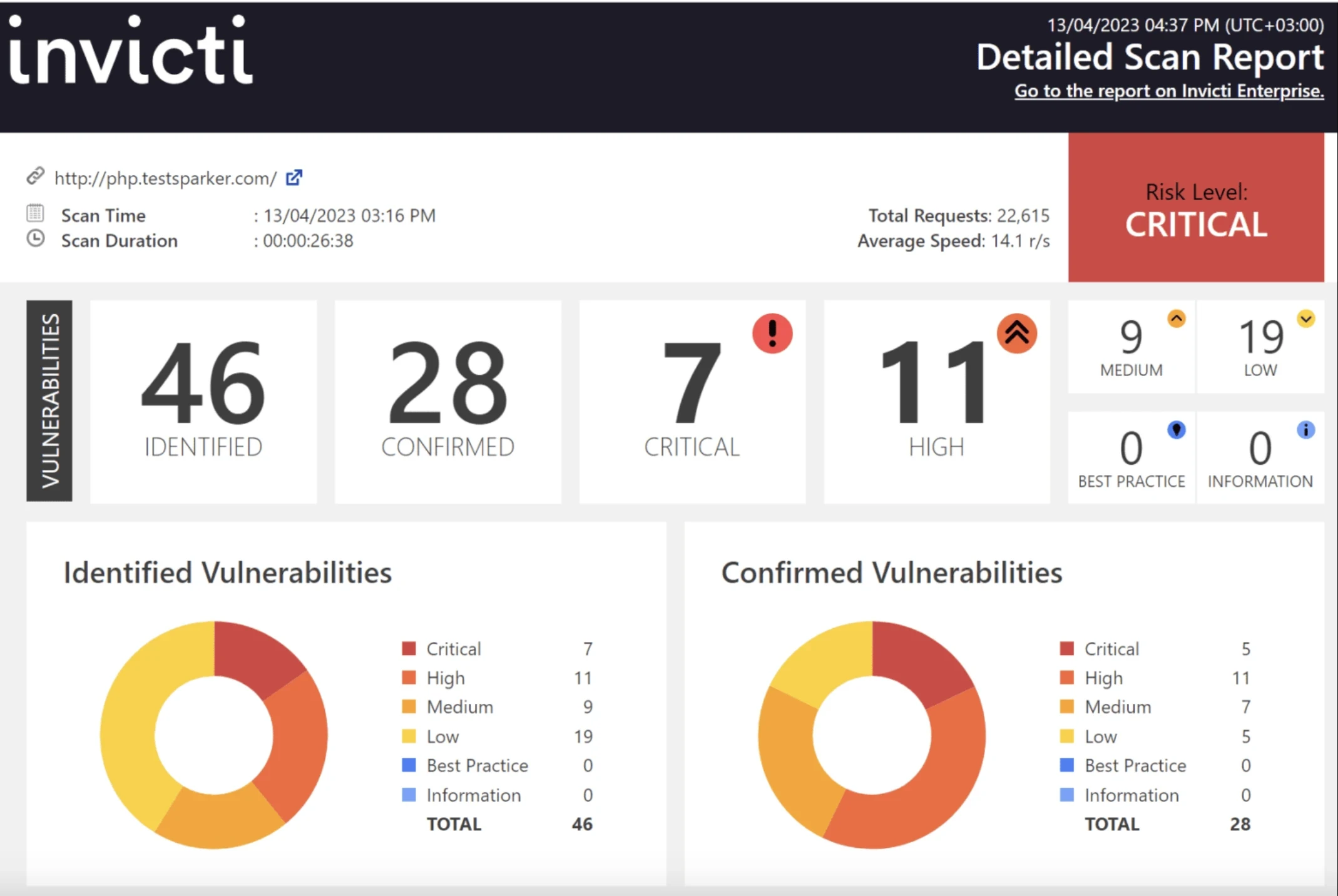
Source - Invicti
Features of Invicti
Performs automatic and accurate security scans for API vulnerabilities.
Performs regular security checks and allows to quickly find vulnerabilities.
Monitors API traffic and alerts for malicious behavior.
Easily combines with CI/CD tools to enable continuous security testing.
Creates accurate security reports with deep fixation advice.
Advantages of Invicti
Easy to install with an easy-to-use interface.
Offers high accuracy with less false positives.
Advanced reporting and analysis.
Integrates with CI/CD to ensure continuous security.
Scalable to both small and large teams.
Disadvantages of Invicti
It may be expensive for small organizations.
Smaller firms may face high costs.
Invicti limits the level of customization for skilled users.
9. Rapid7
Rapid7 provides API security solutions, including real-time vulnerability scanning, risk management, and monitoring. The solution works for both current and a legacy API contexts, offering full security and visibility. Rapid7 reduces API vulnerabilities and ensures long-term security by providing a deep integrations and useful data to businesses.
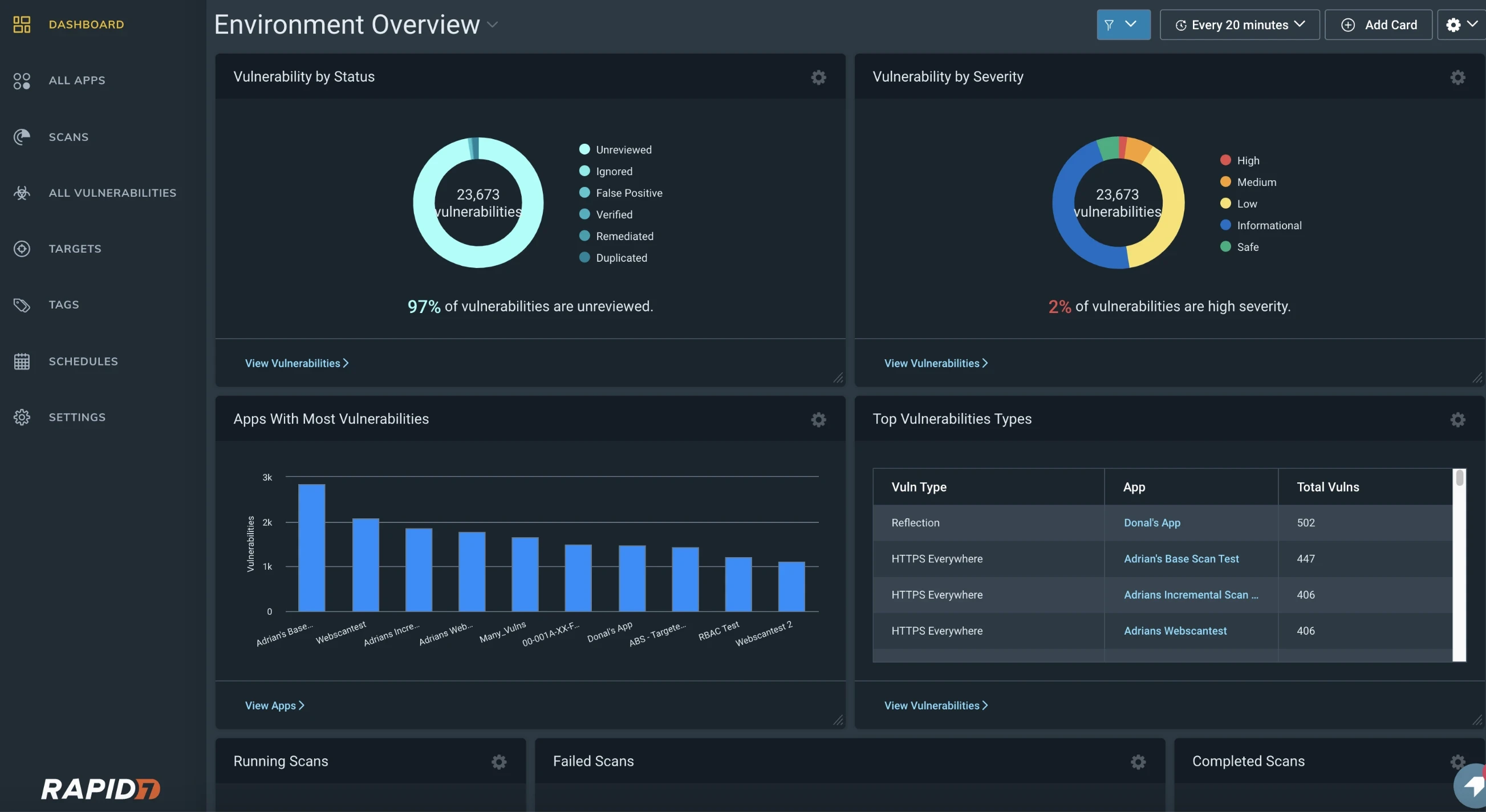
Source - Rapid7
Features of Rapid7
Rapid7 offers API vulnerability management, which checks and manages vulnerabilities across APIs continuously.
Delivers real-time threat intelligence and ranks API risks.
Protects both traditional and microservices APIs.
Compatible with SIEMs, WAFs, and other security solutions.
Provides deep security analysis to help prioritize remedial activities.
Advantages of Rapid7
Complete API vulnerability management.
Comprehensive reporting with actionable insights.
Flexible integration with additional security tools.
Scalable and applicable to both small and large organizations.
Real-time alerts for API vulnerabilities.
Disadvantages of Rapid7
Further configuration is required for maximum efficiency.
Advanced features demand a higher price.
New users have a steep learning curve.
10. Acunetix
Acunetix provides complete vulnerability scanning for web applications and APIs, with a focus on finding and fixing security vulnerabilities before attackers exploit them. Acunetix uses strong automation tools to continuously monitor APIs and online services for potential vulnerabilities. It delivers deep analysis and actionable insights to help organizations prioritize repair activities, hence improving overall API security.
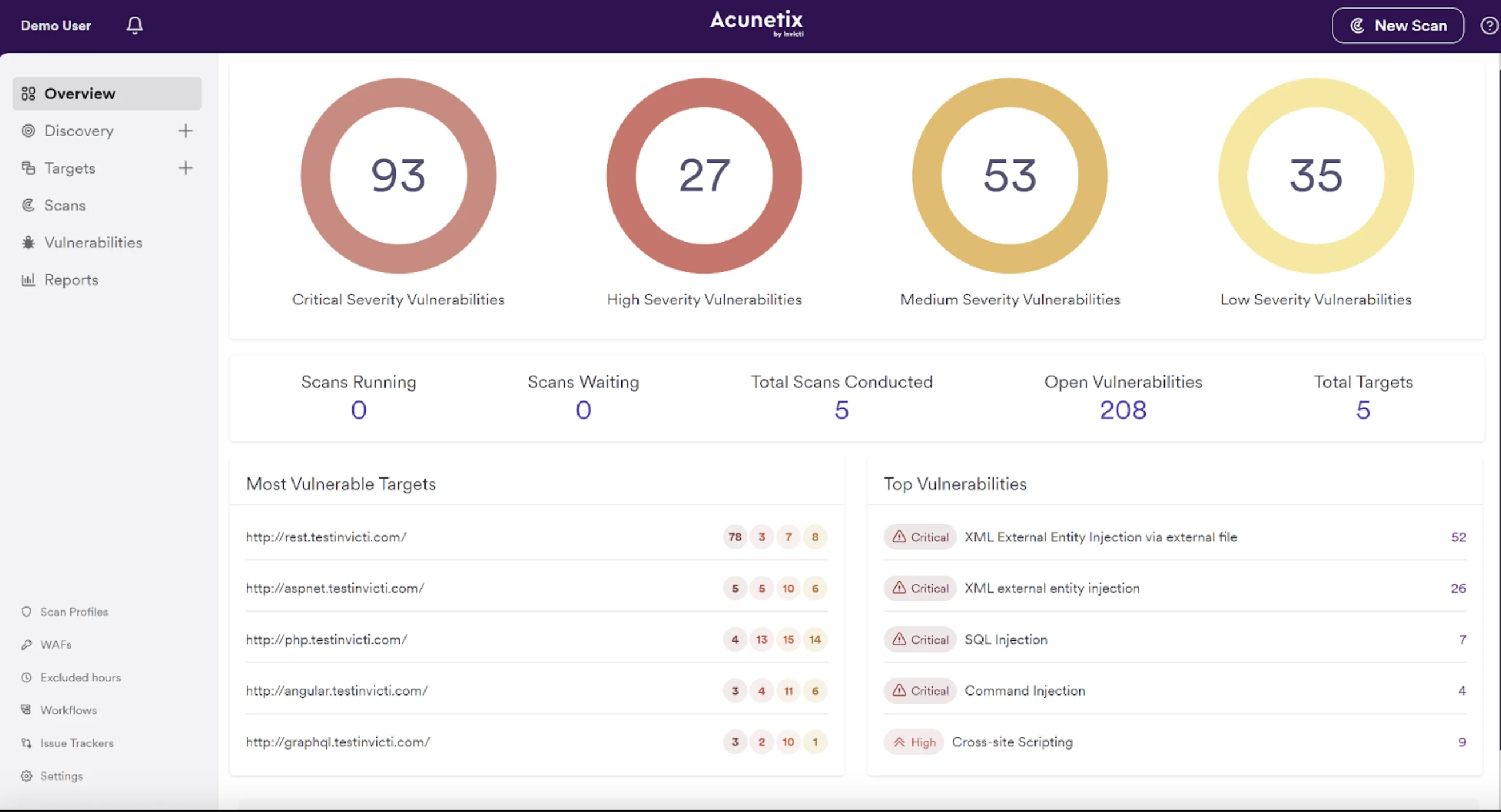
Source - Acunetix
Features of Acunetix
Quickly detects vulnerabilities in APIs and online apps.
Includes support for REST, SOAP, and GraphQL APIs.
Automates security scans to ensure constant API monitoring.
Provides deep and accurate reports for detecting security weaknesses.
Works easily with the DevOps ecosystem and provides continuous security.
Advantages of Acunetix
Rapid and accurate vulnerability scanning.
Complete and deep reports with quick fixation advice.
Connects with current DevOps workflows.
It supports both web apps and APIs.
The UI is user-friendly, with a simple dashboard.
Disadvantages of Acunetix
Smaller organizations will find it expensive.
There is limited support for non-standard API types.
How to Choose the Best API Security Solution
Choosing the right API security solution is essential to protect sensitive data and maintaining the integrity of applications. Here is how to choose the best API security solution:
Check Security Requirements
Different APIs, such as REST, SOAP, and GraphQL, require different security measures. Understanding the types of APIs in use as well as the possible vulnerabilities helps to select the right security solution. When checking security requires consider compliance standards, authentication mechanisms, and data sensitivity.
Scalability
As API systems grow, security solutions must be able to handle the increased volume and complexity. A scalable security platform should be able to handle big request volumes, dynamic situations, and future infrastructure expansion. It should be able to connect to cloud-based, on-premises, or hybrid environments without affecting performance.
Ensure Easy Integration
To ensure a successful implementation, the platform should easily connect with current development and security infrastructure. They should combine with CI/CD pipelines, DevOps workflows, cloud platforms, and API gateways to ensure continuous security. A complete solution reduces operational interruptions while increasing overall security efficiency.
Consider Usability and Automation
The security of API becomes easy due to simple dashboards, fewer human configurations, and automated security weaknesses identification. Automated testing, AI threat detection, and regular monitoring reduce workloads for security teams.
Consider Cost and Value
API security platforms provide several pricing strategies, including subscription-based, usage-based, and enterprise licensing. Checking features, ROI, and long-term cost implications helps to strike a balance between security efficacy and financial limits. Organizations should choose a solution that provides full security while remaining within their budget.
Final Thoughts
APIsec is an API security platform that automates security testing, identifies vulnerabilities, and continuously follows adherence rules. Organizations can also look at other alternatives that meet their specific demands and budgets.
Each platform offers different features such as automatic vulnerability checks, threat monitoring, and integration options. Each solution has unique features that will help organizations in selecting the best tool for their security needs and goals.
Akto is an API security platform that offers continuous threat detection, behavior-based analysis, and easy integration into modern development workflows. Akto is suitable for organizations of all sizes and provides effective, quick, and flexible API security via an easy-to-use interface.
Schedule a demo today to learn how Akto can improve the organization's API security.
